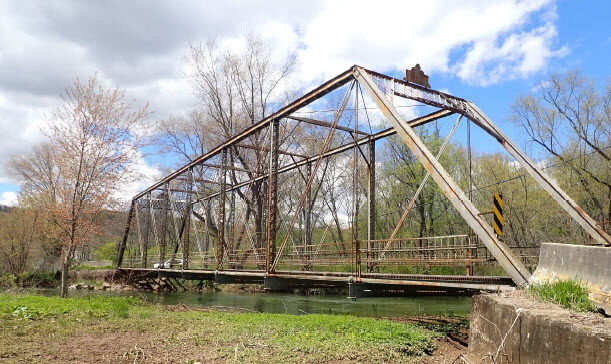Last year, we announced PennDOT’s new funding source for historic metal truss bridges and highlighted two rehabilitation projects that were selected for the new program. With those projects well on their way, the Historic Metal Truss Bridge Capital Rehabilitation Program has since added four additional bridge projects across the Commonwealth.
To quickly recap, the Historic Metal Truss Bridge Capital Rehabilitation Program was created to promote the rehabilitation of historic metal truss bridges for continuous vehicular transportation use. The Program can also provide support for adaptive re-use projects seeking additional financial support.
The Program is set to last ten years and includes a grant total of $18 million. The funding for the Program comes from Federal Surface Transportation Program (STP) discretionary funding (SPIKE funds) and does not require a local match. Additional funds have been added to the Program as mitigation for the loss of other historic metal truss bridges that could not be rehabilitated to meet vehicular needs.
Bridge projects eligible for funding through the Program are selected by a committee comprised of representatives from PennDOT, the Federal Highway Administration (FHWA), and PA SHPO.
The following metal truss bridges have been selected as rehabilitation projects for continuous vehicular use. Each bridge is individually eligible for the National Register of Historic Places under Criterion C for its engineering significance.
Valley Cross Bridge
Valley Cross Road Bridge in Keating Township, McKean County. Photograph by PennDOT.
Valley Cross Road Bridge, built in 1888, is a single span, wrought iron, pin-connected Pratt thru truss in Keating Township, McKean County. The bridge spans 146 feet across Potato Creek.
Valley Cross Road Bridge in Keating Township, McKean County. Photograph by PennDOT.
The character defining features of the Valley Cross Road Bridge, the elements that showcase the bridge’s historic significance and contribute to its National Register eligibility, include the truss material, truss form, method of connection, U shaped hangers, top and bottom chords, vertical and diagonal members, the top chord lateral bracing, and portal bracing. The decorative railings and bridge plaques are also significant features.
Burnt Mill Road Bridge
Elevation view of the Burnt Mill Road Bridge, located in Lurgan Township, Franklin County over Conodoguinet Creek. Photograph by PennDOT.
Located in Lurgan Township, Franklin County, Burnt Mill Road Bridge, also known as County Bridge No. 66, spans 105 feet across Conodoguinet Creek. This single span bridge is a wrought iron, pin connected Pratt thru truss built in 1885.
Portal view of the Burnt Mill Road Bridge, located in Lurgan Township, Franklin County. Photograph by PennDOT.
The bridge’s character defining features include the truss material, truss form, method of connection, top and bottom chords, and vertical and diagonal members. The bridge plaques are also a significant feature of the bridge.
Faux Road Bridge
Elevation view of the Faux Road Bridge, located in Hollenback Township, Luzerne County, over Wapwallopen Creek. Photograph by PennDOT.
Faux Road Bridge, located in Hollenback Township, Luzerne County, is a single span, pin-connected Pratt pony truss spanning 45 feet over Wapwallopen Creek.
View of the right truss on Faux Road Bridge, showcasing the bridge’s Phoenix section top chord and inclined end posts. Photograph by PennDOT.
The character-defining features of the Faux Road Bridge include the truss material, truss form, method end connection, the Phoenix section top chords and inclined end posts, and the U-bolt floorbeam connection detail.
Devereux Road Bridge
Elevation view of the Devereux Road Bridge, located in Wallace Township, Chester County. Photograph by PennDOT.
Devereux Road Bridge, also known as Steels Bridge or Chester County Bridge No. 138, is located in Wallace Township, Chester County. This bridge, built in 1877, is a single span, wrought iron, pin-connected Pratt pony truss spanning 76 feet over the East Branch of Brandywine Creek. The local bridge owner, Chester County, is supporting this rehabilitation project with funding during preliminary engineering.
View of the left truss on Devereux Road Bridge. Photograph by PennDOT.
The bridge’s character defining features include the truss form and the truss members (built up lattice verticals, T sections, and fishbelly floorbeams). Significant features include the decorative cast iron caps on the floor beam ends and the bridge plaque, which add to the bridge’s high artistic value.
The bridges listed above will be rehabilitated following the Secretary of the Interior’s Standards for Rehabilitation to maintain their character defining features.
PennDOT, FHWA and the PA SHPO hope to utilize the Historic Metal Truss Bridge Capital Rehabilitation Program to support additional projects in the near future. For more information about the program, check out the Program Overview and Frequently Asked Questions.
________________________________________________________________________________________________________
Today’s post is by Guest Contributor Veronica Martin. Veronica is the Architectural Historian for District 8 and the acting Historic Bridge Program Manager for the Pennsylvania Department of Transportation.
Comment Policy
PHMC welcomes and encourages topic-related comments on this blog. PHMC reserves the right to remove comments that in PHMC’s discretion do not follow participation guidelines.
Commenters and Comments shall be related to the blog post topic and respectful of others who use this site.
Commenters and Comments shall not: use language that is offensive, inflammatory or provocative (this includes, but is not limited to, using profanity, obscene, or vulgar comments); disparage other commenters or people; condone illegal activity; identify the location of known or suspected archeological sites; post personal information in comments such as addresses, phone numbers, e-mail addresses or other contact details, which may relate to you or other individuals; impersonate or falsely claim to represent a person or an organization; make any commercial endorsement or promotion of any product, service or publication.
If you would like to comment on other topics not related to this blog post but related to PHMC, please fill out the PHMC Contact Us Form.
